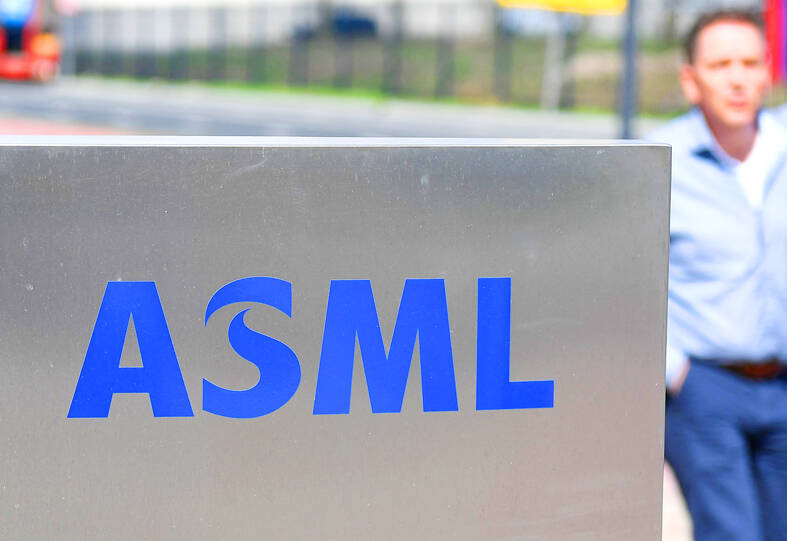ASML Holding NV reported orders for the first quarter that were almost a billion euros less than expected and warned that it does not know how to quantify the impact from recent tariff announcements, which are threatening to upend the semiconductor industry.
The Dutch company, which counts Taiwan Semiconductor Manufacturing Co (台積電) and Intel Corp among its biggest customers, reported bookings of 3.94 billion euros (US$4.48 billion), compared with an average estimate of 4.82 billion euros by analysts surveyed by Bloomberg.
Its shares yesterday sank more than 7 percent in Amsterdam.

Photo: AFP
ASML is the sole producer of cutting-edge lithography machines used by semiconductor companies to make advanced chips for products including Apple Inc’s smartphones and Nvidia Corp’s artificial intelligence (AI) accelerators. Concern over a potential slowdown in AI demand has intensified after disappointing outlooks from some chipmakers and analyst warnings, compounded by looming US tariffs.
“The recent tariff announcements have increased uncertainty in the macro environment and the situation will remain dynamic for a while,” ASML chief executive officer Christophe Fouquet said in a statement yesterday.
ASML outlined ways US tariffs could affect its business, including additional charges on shipments of new systems, tools and parts imported into the country.
Another possible risk is other countries “imposing tariffs on things that are being shipped from the United States into these countries,” ASML chief financial officer Roger Dassen said in a video accompanying the results.
The firm’s “conversations so far” with customers support its expectation that this year and next year would be growth years, driven by AI investments, Fouquet said.
The company’s extreme ultraviolet lithography machines accounted for 1.2 billion euros of net bookings in the quarter.
China accounted for 27 percent of ASML’s net system sales, making it the company’s second-biggest market during the quarter. While that is the same contribution from the preceding three months, it is a drop from the average of 41 percent last year.
ASML forecast that if AI demand continues to be strong and its customers are capable of adding capacity, it had the opportunity to meet the upper range of its total net sales guidance of 30 billion to 35 billion euros for this year.
However, uncertainty with some of its customers could take it to the lower end of the range, it said.
The first quarter orders “disappointed” and the tariff uncertainty is clearly “clouding” the outlook, Citigroup Inc analyst Andrew Gardiner wrote in a note, but pointed to ASML’s reiterated full-year forecast and expectations of further growth next year.
Barclays PLC analyst Simon Coles said that ASML would need 3 billion to 5 billion euros of orders each quarter for the next three to five quarters to hit consensus expectations.
“This seems manageable, but our worry is two major customers are unlikely to be ordering significantly any time soon,” he said.

Taiwan’s long-term economic competitiveness will hinge not only on national champions like Taiwan Semiconductor Manufacturing Co. (TSMC, 台積電) but also on the widespread adoption of artificial intelligence (AI) and other emerging technologies, a US-based scholar has said. At a lecture in Taipei on Tuesday, Jeffrey Ding, assistant professor of political science at the George Washington University and author of "Technology and the Rise of Great Powers," argued that historical experience shows that general-purpose technologies (GPTs) — such as electricity, computers and now AI — shape long-term economic advantages through their diffusion across the broader economy. "What really matters is not who pioneers

In a high-security Shenzhen laboratory, Chinese scientists have built what Washington has spent years trying to prevent: a prototype of a machine capable of producing the cutting-edge semiconductor chips that power artificial intelligence (AI), smartphones and weapons central to Western military dominance, Reuters has learned. Completed early this year and undergoing testing, the prototype fills nearly an entire factory floor. It was built by a team of former engineers from Dutch semiconductor giant ASML who reverse-engineered the company’s extreme ultraviolet lithography (EUV) machines, according to two people with knowledge of the project. EUV machines sit at the heart of a technological Cold

TAIWAN VALUE CHAIN: Foxtron is to fully own Luxgen following the transaction and it plans to launch a new electric model, the Foxtron Bria, in Taiwan next year Yulon Motor Co (裕隆汽車) yesterday said that its board of directors approved the disposal of its electric vehicle (EV) unit, Luxgen Motor Co (納智捷汽車), to Foxtron Vehicle Technologies Co (鴻華先進) for NT$787.6 million (US$24.98 million). Foxtron, a half-half joint venture between Yulon affiliate Hua-Chuang Automobile Information Technical Center Co (華創車電) and Hon Hai Precision Industry Co (鴻海精密), expects to wrap up the deal in the first quarter of next year. Foxtron would fully own Luxgen following the transaction, including five car distributing companies, outlets and all employees. The deal is subject to the approval of the Fair Trade Commission, Foxtron said. “Foxtron will be

INFLATION CONSIDERATION: The BOJ governor said that it would ‘keep making appropriate decisions’ and would adjust depending on the economy and prices The Bank of Japan (BOJ) yesterday raised its benchmark interest rate to the highest in 30 years and said more increases are in the pipeline if conditions allow, in a sign of growing conviction that it can attain the stable inflation target it has pursued for more than a decade. Bank of Japan Governor Kazuo Ueda’s policy board increased the rate by 0.2 percentage points to 0.75 percent, in a unanimous decision, the bank said in a statement. The central bank cited the rising likelihood of its economic outlook being realized. The rate change was expected by all 50 economists surveyed by Bloomberg. The